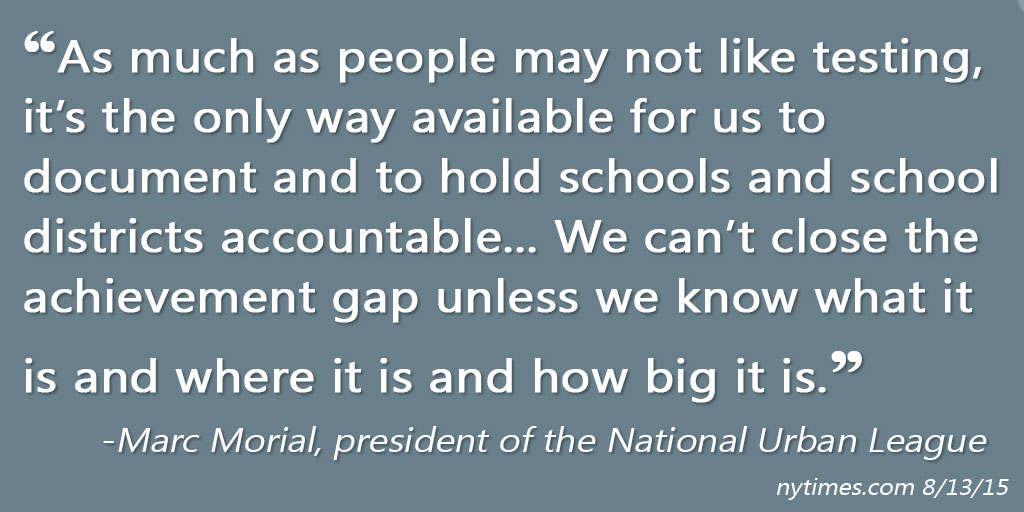Learn More About State Assessments

Annual assessments are an important part of determining how well individual children are doing academically, and whether schools are meeting the needs of all students. These statewide assessments provide valuable information, not only to schools and policy makers who use it to inform and improve education policies, but more importantly to teachers who incorporate the information into their strategy with individual students in the classroom, and to parents who deserve transparent information about their child’s performance.
What about your state?
Learning Heroes’ new site has valuable information for parents wanting to learn more about their state’s tests and the standards they are aligned to. You can search for information by state, grade, and subject:
You can also learn more about the new state assessments from 2010 National Teacher of the Year, Sarah Brown Wessling:
More videos like this one are available on Learning Heroes website: http://bealearninghero.org/
Click here to sign up for Learning Heroes newsletter.
Are these new assessments valuable to colleges and universities?
Definitely. In addition to providing valuable information to teachers, schools, parents, and policymakers, high-quality assessments also provide colleges with information on student readiness for entry-level college courses. With these assessments students have the opportunity to identify and address any academic issues before they leave high school so that they can avoid the time and expense of taking remedial or developmental courses that do not count toward their degrees.
Colleges and universities in states across the country have started to use the results of these assessments – like PARCC and Smarted Balanced – to determine whether admitted students are ready for credit-bearing courses and can be exempted from remedial classes.
What does the civil rights community have to say about assessments?
In May 2015, national civil and human rights groups united in opposition of opting students out of annual tests, and explained how refusing the test robs all students of a quality education, particularly children from underserved communities that have fought to be counted.
Additionally, on August 13th, Marc Morial of the National Urban League told the New York Times:
What #edu & #civilrights groups are saying about New York’s test scores and opt out numbers: http://t.co/5P1nmdjgiJ pic.twitter.com/wrpTJeqDwo
— for Student Success (@StudentSuccess) August 13, 2015
What happens when students are opted out of state assessments?
Parents who are choosing to opt their child out of assessments are:
- Surrendering the opportunity to have an objective snapshot of how their child is developing academically in his or her K-12 journey.
- Denying their student’s teachers, this year and next, the opportunity to measure what skills and subjects their child is adept at, and to discover where he or she needs extra help.
- Accepting that their child’s absence will mean their school has incomplete information when trying to see how it is performing in comparison to other schools. As a result, state policymakers will not be able to see where best to allocate additional funds and programs.
- Jeopardizing their school from receiving crucial federal funds to support your child’s school, including special education and after school programs.
Share shouldyouoptout.com with your friends to spread the word.
As a parent why shouldn’t I opt my kid out?
In a July 2015 op-ed appearing in the US News and World Report, parent Chris Minnich, writes:
“Rather than refusing to allow your children to take the test, I encourage all parents to help improve the way we test kids now and in the future.
I encourage parents to think about this as we gear up for the next school year. Engage your local school leaders in a conversation about your concerns. Parents can reach out to their district superintendent, their school board or the state education department to find out what efforts may already be underway or how they can help find the right balance in the amount and type of assessments kids are taking…”
About the Collaborative for Student Success
At our core, we believe leaders at all levels have a role to play in ensuring success for K-12 students. From ensuring schools and teachers are equipped with the best materials to spotlighting the innovative and bold ways federal recovery dollars are being used to drive needed changes, the Collaborative for Student Success aims to inform and amplify policies making a difference for students and families.
To recover from the most disruptive event in the history of American public schools, states and districts are leveraging unprecedented resources to make sure classrooms are safe for learning, providing students and teachers with the high-quality instructional materials they deserve, and are rethinking how best to measure learning so supports are targeted where they’re needed most.


